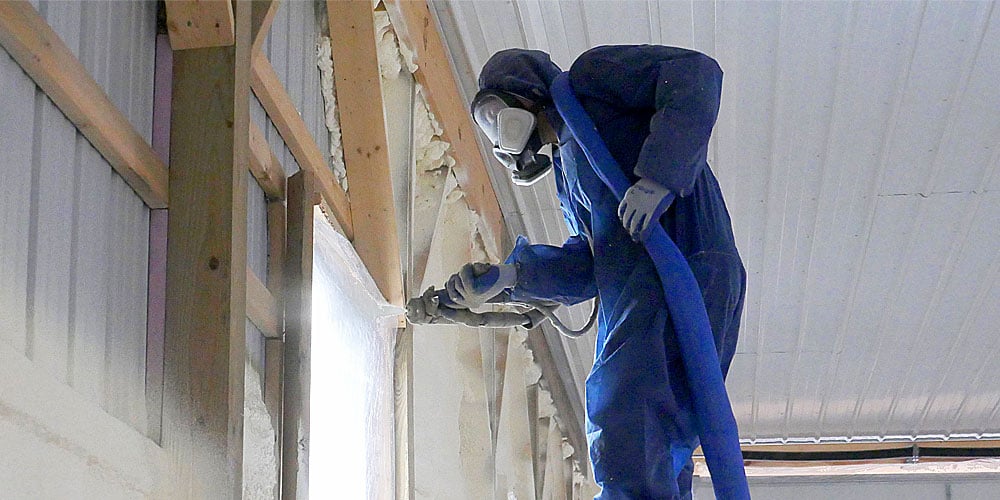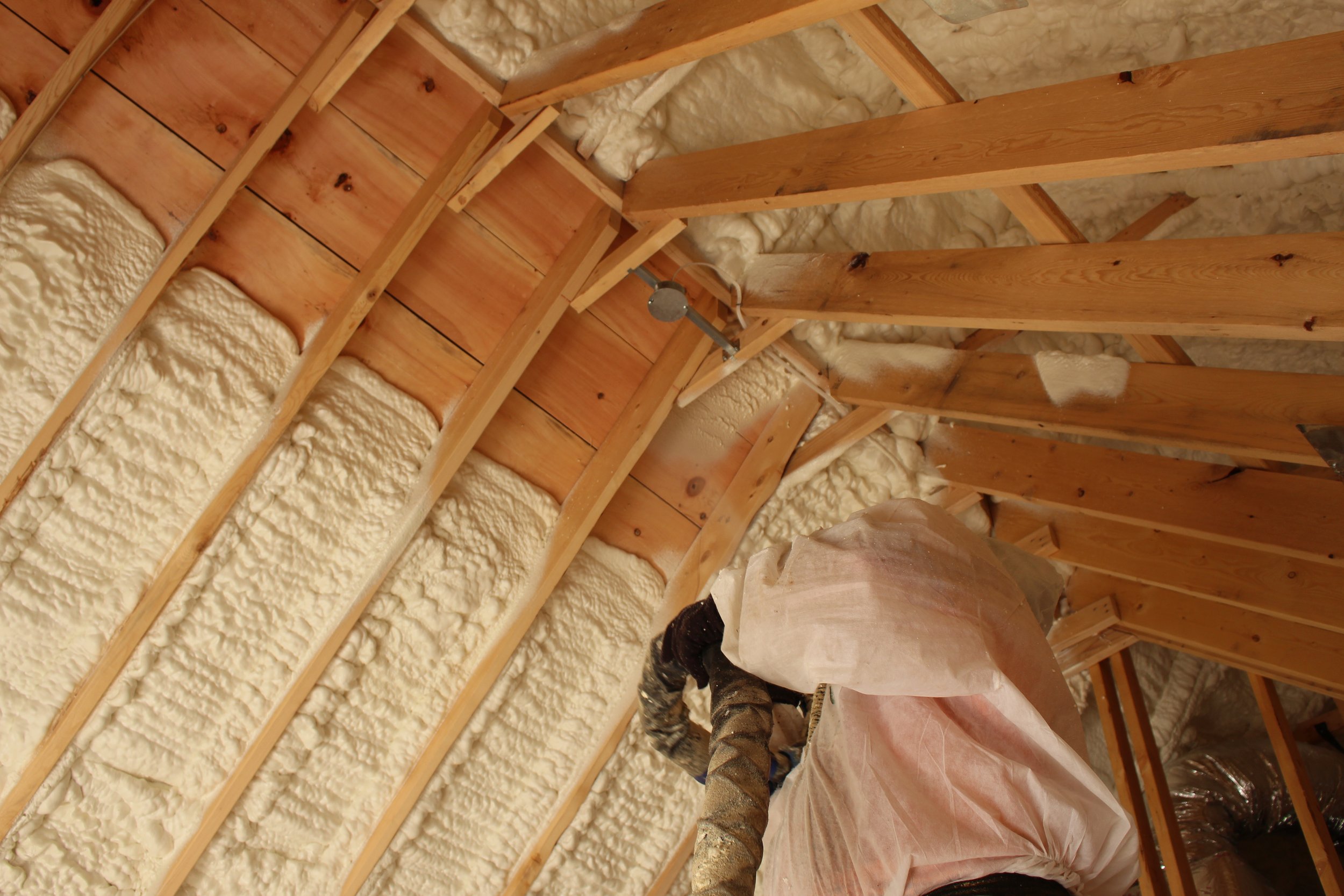Frequently Asked Questions Regarding Spray Foam Installation and Use
Spray Foam: The Ultimate Solution for Air Sealing and Insulation
Spray foam insulation has emerged as a leading service for efficient air securing and thermal insulation, supplying a special combination of homes that establish it apart from standard methods. Understanding the complete extent of its benefits, installment processes, and contrasts with other insulation kinds is important for making informed choices.
What Is Spray Foam?
Spray foam is a versatile insulation product that combines the concepts of air securing and thermal resistance to enhance energy performance in buildings. Made up mainly of polyurethane or various other similar substances, spray foam is applied as a fluid that increases upon contact with surfaces, developing a solid, constant layer of insulation. This one-of-a-kind residential property allows it to fill voids, cracks, and spaces that typical insulation materials may forget, giving a premium air seal.
There are two main kinds of spray foam: open-cell and closed-cell. Open-cell spray foam is lighter and extra flexible, offering superb sound absorption and a lower R-value per inch - Spray Foam. On the other hand, closed-cell spray foam is denser, giving a higher R-value, wetness resistance, and added architectural honesty to building elements
The application procedure typically involves specific devices, making certain a seamless application that sticks to different substratums, including timber, concrete, and steel. This flexibility makes spray foam suitable for both brand-new buildings and retrofitting existing frameworks. Its capacity to develop a closed barrier significantly adds to decreasing energy usage and enhancing interior air top quality, therefore making it a preferred selection amongst builders and home owners alike.
Advantages of Spray Foam Insulation
Among the most significant benefits of spray foam insulation is its remarkable ability to create a continual air obstacle, which successfully reduces power loss. Unlike typical insulation products, spray foam expands to load voids and fractures, making certain that air leakage is dramatically minimized. This characteristic not just improves power efficiency however also brings about reduce utility costs in time.
Additionally, spray foam insulation supplies exceptional thermal resistance, adding to an extra stable interior environment. Its high R-value per inch allows for reliable insulation in restricted areas, making it optimal for attic rooms, walls, and crawl areas. Furthermore, the moisture-resistant buildings of spray foam assistance prevent mold and mildew and mildew development, advertising healthier living problems.
An additional crucial advantage of spray foam insulation is its sound-dampening high qualities (Spray Foam). It effectively decreases sound transmission in between spaces, developing a quieter and much more comfy home environment. The toughness of spray foam additionally attracts attention, as it does not droop or settle gradually, keeping its performance throughout its life expectancy
Just How Spray Foam Functions
Understanding exactly how spray foam insulation functions is important for valuing its performance in air securing and thermal resistance. Spray foam insulation includes two main parts: isocyanate and polyol resin. When these elements are combined, they undertake a chain reaction that triggers the product to increase swiftly, developing a thick foam that loads cracks, voids, and dental caries.
As the foam expands, it adheres to surface areas, creating an airtight seal that substantially reduces air seepage. This particular makes spray foam insulation very effective at avoiding drafts and wetness go to this site infiltration, which can lead to power loss and damage with time. Furthermore, the closed-cell variant of spray foam supplies premium thermal resistance because of its stiff structure, effectively decreasing warm transfer.
The unique properties of spray foam enable it to adhere to uneven surfaces, guaranteeing comprehensive protection and a seamless barrier. Therefore, spray foam insulation not only boosts energy performance however additionally adds to improved interior air quality by minimizing the buildup of allergens and toxins. Inevitably, comprehending the technicians behind spray foam underscores its function as an exceptional selection for insulation and air securing in both commercial and property applications.
Installment Refine Introduction

Prior to installation, the room must be effectively cleaned and prepped, ensuring that surfaces are free from debris, wetness, and dirt. Because impurities can endanger attachment and total efficiency, this action is critical. As soon as the location is prepared, the application includes mixing the 2 elements of the spray foam, which increases upon call and fills up gaps efficiently.
Trained specialists need to perform the installment, using specific equipment to guarantee uniform coverage and optimum thickness. Security precautions, consisting of putting on protective gear and ensuring proper ventilation, are vital during this procedure. After application, the foam commonly remedies rapidly, forming a solid barrier that boosts power efficiency.
Contrasting Spray Foam to Typical Insulation
When reviewing insulation alternatives, spray foam insulation sticks out in contrast to conventional materials such as fiberglass and cellulose. One of the key benefits of spray foam is its exceptional air securing abilities. Unlike fiberglass and cellulose, which can allow air seepage, spray foam broadens upon application, filling holes and voids to produce an airtight seal. This causes improved power performance, as much less warmed or cooled down air gets away the home, leading to reduced energy expenses.
In addition, spray foam offers a higher R-value per inch than typical insulation types, providing more reliable thermal resistance in a thinner account. This characteristic is especially valuable in rooms with limited dental caries deepness. Additionally, spray foam is resistant to wetness and mold and mildew development, which can be a significant interest in cellulose and fiberglass, particularly in moist settings.
However, spray foam insulation commonly lugs a greater upfront cost than its conventional counterparts. House owners need to evaluate this first basics financial investment versus long-term energy savings and performance benefits. Eventually, while both insulation kinds offer their objective, spray foam becomes an advanced service for contemporary insulation needs, particularly in terms of air securing and thermal efficiency.

Verdict
In recap, spray foam insulation represents a very efficient solution for accomplishing optimum air sealing and thermal resistance. Its distinct residential or commercial properties, consisting of moisture resistance and noise dampening, make it ideal for various applications in both new constructions and retrofitting jobs (Spray Foam). The first costs may be higher contrasted to traditional insulation products, the long-term benefits, such as considerable power savings and enhanced interior air quality, validate the investment and emphasize its worth in contemporary structure techniques.
Spray foam insulation has emerged as a leading remedy for effective content air sealing and thermal insulation, supplying a special combination of homes that establish it apart from traditional methods.Spray foam is a functional insulation product that incorporates the concepts of air securing and thermal resistance to enhance energy effectiveness in structures.When examining insulation options, spray foam insulation stands out in comparison to traditional materials such as fiberglass and cellulose. Ultimately, while both insulation kinds offer their purpose, spray foam emerges as a more sophisticated service for contemporary insulation requirements, especially in terms of air sealing and thermal effectiveness.
In summary, spray foam insulation stands for an extremely effective option for accomplishing optimum air sealing and thermal resistance.